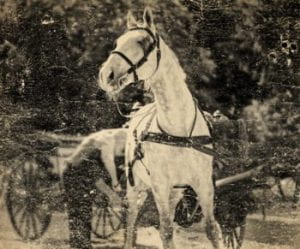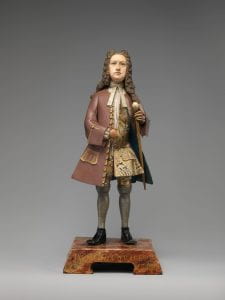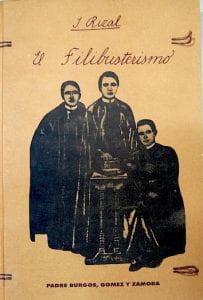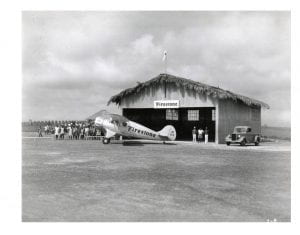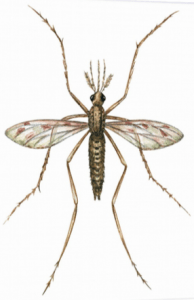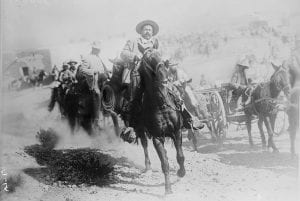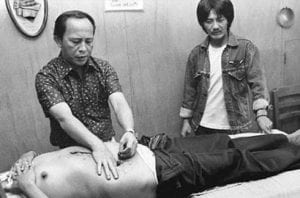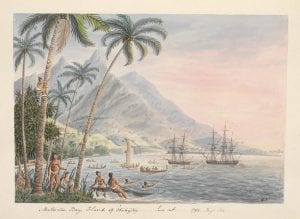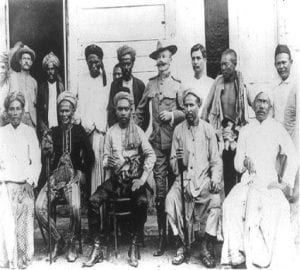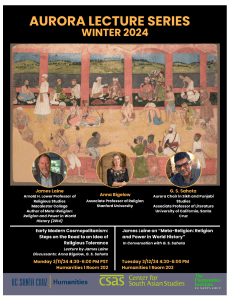 March 11, 2024: The Aurora Lecture: Jim Laine, “Early Modern Cosmopolitanism: Steps on the Road to an Idea of Religious Tolerance”
March 11, 2024: The Aurora Lecture: Jim Laine, “Early Modern Cosmopolitanism: Steps on the Road to an Idea of Religious Tolerance”
Hum 1, rm. 202, 4:30 to 6 p.m.
The Literature Department invites members of the CWH community to attend the 2024 Winter Aurora Lecture featuring Professor James W. Laine (Arnold H. Lowe Professor of Religious Studies, Macalester College), with discussants Anna Bigelow (Associate Professor of Religion at Stanford University) and G.S. Sahota (Associate Professor of Literature and Aurora Chair at UC Santa Cruz).
March 12, 2024: The Aurora Lecture: Jim Laine, book discussion of his Meta-Religion: Religion and Power in World History
Hum 1, rm. 202, 4:30 to 6 p.m.
The Literature Department invites members of the CWH community to attend a book discussion in conjunction with the 2024 Winter Aurora Lecture, with Professor James Laine (Arnold H. Lowe Professor of Religious Studies, Macalester College), on his book Meta-Religion: Religion and Power in World History.
2023-2024 Events
October 20, 2023: 4th Grad Student Conference: “The Micro as Macro: Narrating World Histories of Science, Technology, and Environment”
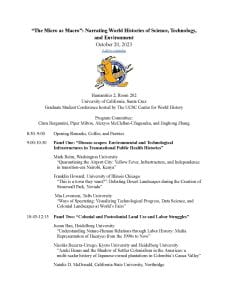 While world history topics have expanded recently to include diverse areas, the Euro-American experience continues to dominate scholarship and is often treated as the assumed global model. The UCSC Center for World History’s fourth (almost) annual graduate student conference explores non-European places and actors by centering on techno-scientific, environmental, sensorial, and spatial-based themes that reveal how the relationship between “small” subjects like microorganisms have shaped world history in ways that challenge or reimagine conceptions of progress and development. With this in mind, this conference will focus on histories spanning from 1700 to the present that tell global stories through small subjects such as viruses, cotton seeds, and metal alloys. By inviting a wide range of chronological and geographic loci, we hope to expand our definition of world history to one that does not default toward Euro-American experiences.
While world history topics have expanded recently to include diverse areas, the Euro-American experience continues to dominate scholarship and is often treated as the assumed global model. The UCSC Center for World History’s fourth (almost) annual graduate student conference explores non-European places and actors by centering on techno-scientific, environmental, sensorial, and spatial-based themes that reveal how the relationship between “small” subjects like microorganisms have shaped world history in ways that challenge or reimagine conceptions of progress and development. With this in mind, this conference will focus on histories spanning from 1700 to the present that tell global stories through small subjects such as viruses, cotton seeds, and metal alloys. By inviting a wide range of chronological and geographic loci, we hope to expand our definition of world history to one that does not default toward Euro-American experiences.
The Program is available here.
Dr. David Fedman, Associate Professor of History at UC Irvine and author of Seeds of Control: Japan’s Empire of Forestry in Colonial Korea, will deliver the keynote address.
Conference Organizing Committee: Clara Bergamini, Piper Milton, Alexyss McClellan-Ufugusuku, Jinghong Zhang
2022-2023 Events
May 23, 2023: Hannah Zeavin, “Sigmund Freud: Tele-Analyst”
Hum 2, 359; 5:00-6:30pm
In The Distance Cure: A History of Teletherapy, Hannah Zeavin shows that, far from a recent concern in the COVID-19 pandemic, teletherapy is as old as psychoanalysis itself. It may be well known that Sigmund Freud routinely used media metaphorically in his theories of the psychic apparatus; this talk recovers the early history of Freud’s real use of media in therapies over distance.
Zeavin reads epistolary and postal conventions in Freud’s moment, intertwined with Freud’s own epistolary self-analysis (in correspondence with Wilhelm Fliess) and the unconventional treatment by correspondence of his only child patient, the agoraphobic “Little Hans,” in order to rethink the coincidental origins of psychoanalysis and teletherapy, and to help us think through narratives of loss that attend current uses of technology to mediate therapy.
Free and open to the campus community and the public.
April 27, 2023: Roberta Wue, “Inventing the Chinese Craftsman: Amoy Chinqua and the 18th Century Export Portrait”
The sudden appearance of painted and unfired clay portraits of western merchants in the burgeoning China trade of the early eighteenth century marks some of the earliest manifestations of Chinese trade portraiture or trade “art” – and Chinese artisan. Originating with the craftsman Amoy Chinqua (active 1716-20), these curious and vivid portraits function in a new space of intercultural commerce and exchange, as articulated through their unusual materials, crafting, and authorship.
Roberta Wue works on late Qing and early twentieth-century China, with a particular interest in painting, photography, print culture, and intermediality. Her work examines issues of audience and picturing, while analyzing genre, heterogeneity and hybridity, seriality, and movement in modern Chinese art and visual culture. She is the author of Art Worlds: Artists, Images, and Audiences in Late Nineteenth-Century Shanghai.
This talk will excavate the Philippine nation’s cosmopolitan and transnational Asian intellectual moorings, in order to reconnect Philippine history to that of Southeast Asia, from which it has been historiographically separated. It argues that turn-of-the-twentieth-century Philippine Asianism was crucial to the concept of the Filipino nation that the ilustrados (educated elite) constructed, to the ilustrado-led Propaganda Movement’s political argumentation against Spain, and to the political mobilization and organizing of the Katipunan and the First Philippine Republic. It incorporates the “periphery” into our understanding of Pan-Asianism to correct our exclusively intellectual historical and Northeast-Asia-centric understandings of Pan-Asianism. It shows that the revolutionary First Philippine Republic’s foreign collaboration represents the first instance of fellow Pan-Asianists lending material aid toward anti-colonial revolution against a Western power (rather than overthrow of a domestic dynasty) and harnessing transnational Pan-Asian networks of support, activism, and association toward doing so.
Originally from the Philippines, Nicole CuUnjieng Aboitiz is a Research Fellow at the University of Cambridge, in the UK, and the Executive Director of the Toynbee Prize Foundation. Prior to Cambridge, she was a Postdoctoral Fellow at the Weatherhead Center for International Affairs at Harvard University. She earned her Ph.D. in Southeast Asian and International History at Yale University. Her first book, Asian Place, Filipino Nation: A Global Intellectual History of the Philippine Revolution, 1887-1912, published by Columbia University Press in June 2020, charts the emplotment of ‘place’ in the proto-national thought and revolutionary organising of turn-of-the-twentieth-century Filipino thinkers. Her broad research interests center on global intellectual history and Southeast Asian environmental, cultural, and social history.
2020-2021 Events
May 17, 2021: The Thom Gentle Environmental History Lecture
In the early 1920s, Americans owned 80 percent of the world’s automobiles and consumed 75 percent of the world’s rubber. But only one percent of the world’s rubber grew under the U.S. flag, creating a bottleneck that hampered the nation’s explosive economic expansion. To solve its conundrum, the Firestone Tire and Rubber Company turned to a tiny West African nation, Liberia, founded in 1847 as a free Black republic.
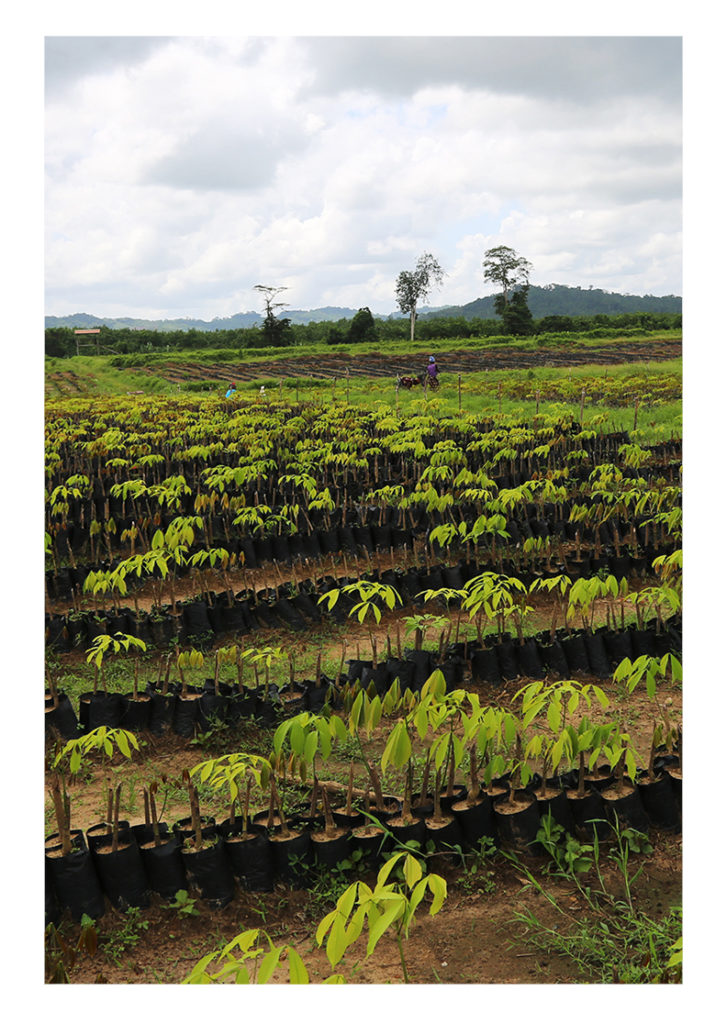
Young rubber trees on a Liberia plantation.
Empire of Rubber tells a riveting story of of ecology and disease, of commerce and science, and of racial politics and political maneuvering, as Firestone sought to transform Liberia into America’ rubber empire. Drawing upon excerpts from Mitman’s forthcoming book, this talk illuminates how Black activists, writers, scientists, diplomats, and businesspeople across the African diaspora rallied to support or oppose the experiment that was Firestone in Liberia. It also offers an intimate portrait of how industrial ecologies, born of racial capitalism, shaped the relationships among people, trees, chemicals, machines, and parasites on what became a Jim Crow corporate enclave on African soil.
Gregg Mitman is the Vilas Research and William Coleman Professor of History, Medical History, and Environmental Studies at the University of Wisconsin-Madison. His latest book, Empire of Rubber: Firestone’s Scramble for Land and Power in Liberia, will be published by The New Press in the fall of 2021. He is also the author of Breathing Space: How Allergies Shape Our Lives and Landscapes; Reel Nature: America’s Romance with Wildlife on Film; and State of Nature: Ecology, Community, and American Social Thought, 1900-1950.
This lecture is made possible by the generosity of Thom Gentle (Cowell ’69, History), a pioneer class alumnus who established The Thom Gentle Endowment for History to support student awards in environmental history as well as lectures of distinguished speakers with an environmental emphasis.
2019-2020 Events
April 24, 2020: 3rd Annual Grad Student Conference: “The Challenge of Diversity: A Conference on Global Minorities”
Hum 2, rm. 259; 8:30 AM – 6:00 PM
***Postponed and then canceled due to Covid-19***
Organizing Committee: Christian Alvarado, David Thomas Duncan, Crystal Smith, Linda Ulbrich
In recent years, the resurgence of far right-wing nationalism has been one of the most profound trends within global politics. This phenomenon has manifested in such geographically-diverse areas as the United States, Great Britain, France, Mexico, Brazil, the Philippines, Eastern Europe, India, and others. The shifting grounds of racial, ethnic, and national identities are central to this phenomenon. This conference aims to stimulate robust discussion of research focused on the creation and experiences of minorities across different societies. Of particular interest are the many ways in which the idea of “diversity” itself has constituted the terrain on which racial formations have been constructed. The papers presented will consider a wide spectrum of issues affecting the minoritized.
March 7, 2020: Caribbean Shores: Networks and Materialities, From Slavery to Freedom
A joint conference of the UCSC Center For World History and the UCSC Archaeological Research Center
Keynote Speakers:
Vincent Brown, Professor of History, Harvard University
Theresa Singleton, Professor of Archaeology, Syracuse University
The past few decades have witnessed the rapid growth in interest by both historians and archaeologists, in the everyday lives of enslaved Africans in Caribbean colonial settings. At the same time, however, scholars in these closely related fields find few opportunities to interact and learn from one another. In light of this emerging demand for intellectual cross fertilization, we are hosting a one-day conference to bring scholars of Slavery and the African Diaspora from the UC Campus and beyond into dialogue with one another. A joint collaboration between UCSC’s Center for World History and Archaeological Research Center, Caribbean Shores will invite scholars in archaeology, history, and other related fields to explore the interrelated concepts of networks and materiality, resistance and marronage, and sovereignty after slavery, to understand the lived experience of enslaved peoples in the Caribbean and its broader littoral.
Sponsored by the University of California Humanities Research Institute and the UCSC Humanities Institute
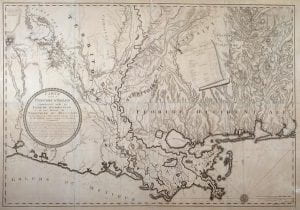
Barthélémy Lafon, Carte Générale du Territoire D’Orléans Comprenant aussi la Floride Occidentale et une Portion du Territoire Du Mississipi (1806). From the Historic New Orleans Collection.
January 15, 2020: The Thom Gentle Environmental History Lecture
In this talk, Urmi Willoughby will present her research on agriculture, development, and the growth of endemic fevers in lower Louisiana. She will explore why fevers spread in the borderlands of the Gulf South and lower Mississippi Valley in the eighteenth and nineteenth centuries, and show how economic and agricultural systems associated with white settlement and plantation slavery fostered the spread of malaria and yellow fever. Malaria
grew endemic in new settlements and plantations as newcomers cleared forests, drained swamps, and grew rice and maize. Yellow fever caused seasonal epidemics in the built environment of New Orleans, as a result of ecological changes caused by sugar plantations and urban construction. Studying these processes in a global framework, this project considers the Gulf South region as a representation of global patterns of development and ecological change in fostering the growth of malaria and yellow fever in diverse geographical and historical contexts.
Urmi Engineer Willoughby is the current Molina Fellow in the History of Medicine and Allied Sciences at the Huntington Library and the author of Yellow Fever, Race, and Ecology in Nineteenth-Century New Orleans (LSU Press, 2017). She completed her Ph.D. in History at UCSC.
This lecture is made possible by the generosity of Thom Gentle (Cowell ’69, History), a pioneer class alumnus who established The Thom Gentle Endowment for History to support student awards in environmental history as well as lectures of distinguished speakers with an environmental emphasis.
November 14, 2019: Mikael Wolfe, “Extreme Weather and the Mexican Revolution: Historical Reality and Perception”
Mikael Wolfe is an environmental historian of water and climate issues in modern Latin America. He is currently Assistant Professor of History at Stanford University and the author of Watering the Revolution: An Environmental and Technological History of Agrarian Reform in Mexico (Duke University Press, 2017), which won the Elinor K. Melville Book Prize for Latin American environmental history and was short-listed for the María Elena Martínez Prize on the history of Mexico in 2018. His second book project is tentatively entitled Revolution in the Air: A Comparative Historical Climatology of the Mexican and Cuban Revolutions.
2018-2019 Events
May 9, 2019: Deirdre de la Cruz, “Psychic Surgery and Other Philippine Phenomena of the Global Occult”
In the variegated landscape of the Filipino paranormal, one phenomenon garnered worldwide attention in the last quarter of the twentieth century: psychic surgery. A form of spiritual healing in which the practitioner, or espiritista, usually male, operates on the body of the patient without anaesthesia and using only his hands, psychic surgery achieved particular renown in the United States in the 1980s when celebrity practitioners of New Age spirituality like Shirley MacLaine spoke publicly about their experience with Filipino psychic surgeons. This talk first provides a broad historical outline of the esoteric movements in the twentieth-century Philippines that culminated in the convergence of New Age spirituality and Filipino Spiritism seen in psychic surgery, paying particular attention to the axial shift from Espiritismo (the science of communication with the dead codified by French educator Allan Kardec and introduced to the Philippines at the turn of the twentieth century), to transpacific New Age movements. It then digs deep into the spectacle of healing that drew thousands of patients from around the world at a time when the Philippines was in the sway of the greatest cheat of all, Ferdinand Marcos.
Deirdre de la Cruz is an Associate Professor of Southeast Asian Studies and History at the University of Michigan. Her first book, Mother Figured: Marian Apparitions and the Making of a Filipino Universal, examined the frequent reports of visions and miracles of the Virgin Mary in the Philippines in the nineteenth and twentieth centuries to explore the intersections between particular local practices and global Catholicism.
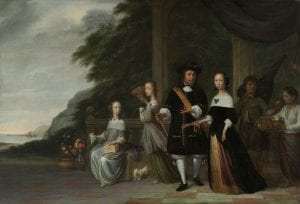
Pieter Cnoll, Cornelia van Nijenrode, and their Daughters in Batavia (now Jakarta), by Jacob Coeman, 1665
April 25, 2019: Susanah Romney, “Unfree Intimacies: Gender and the Taking of Terraqueous Space at Batavia in the Seventeenth Century”
Colonization is not a one-time land grab, but rather an ongoing process of claiming space. Batavia, as the Dutch urban port city on Java in the seventeenth century was known, provides an opportunity to explore the role of gender in this unfolding process. There, the appropriation of local and regional terraqueous space relied on a simultaneous colonization of intimate space. Women of Batavia, as wives, concubines, and slaves, played an often unwilling role in the construction of empire at the intimate, local, and transoceanic scales.
Susanah Romney is an Assistant Professor of History at NYU. Her first book, New Netherland Connections, garnered three book prizes, including the 2014 Book Prize from the Berkshire Conference of Women Historians. Professor Romney is also a UCSC alum.
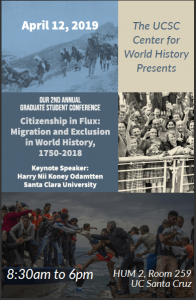 April 12, 2019: 2nd Annual Grad Student Conference: “Citizenship in Flux: Migration and Exclusion in World History, 1750-2019”
April 12, 2019: 2nd Annual Grad Student Conference: “Citizenship in Flux: Migration and Exclusion in World History, 1750-2019”
Hum 2, rm. 259; 8:30 AM – 6:00 PM
Keynote Speaker: Dr. Harry Nii Koney Odamtten
Associate Professor of African and Atlantic History at Santa Clara University
The rise of nativist or nationalist movements in many countries and the closing of borders to migrants seeking refuge from persecution, war, and violence calls into question the world historical context of migration, borders, and political belonging. This conference queries citizenship and borders across time and region to make sense of their implications for citizens, non-citizens , subjects, refugees, and exiles in world history. We welcome broad definitions of “border,” “citizenship,” and “migration”to include boundaries that migrate even when people themselves do not, citizenships that are defined by entities other than the state, and migrations that don’t require physical movement (e.g., movement among identities that can affect citizenship, like race or religion).
View the program here.
March 13, 2019: Thom Gentle Environmental History Lecture
Kevin McDonald, “Babbo and the Breadfruit: Plants, Oceans, and Empires in the Age of Enlightenment”
Hum 1, rm. 210; 4:00-5:30 PM
At the end of the eighteenth century, a fantastic global plot was conjured up by a network of invested individuals that eventually reached the highest levels of the British state and the Admiralty. The plan: to transplant South Pacific breadfruit to the Caribbean Islands to feed the slaves of empire. Slaves grew sugar that fueled the proto-industrial workforce of England, and sugar produced rum, that powered the imperial navy. This research talk will explore the trans-oceanic exchanges not just of breadfruit, but of Atlantic and Pacific maritime cultures from ca. 1767-1798. Tracing the story of Babbo and the breadfruit allows us to intersect the surprisingly entangled histories of the South Pacific, Europe, Africa, and the Caribbean, in a global history connected by plants, oceans, and empires; and the fusion of not two but three tropical farming systems (Africa, the West Indies, and the South Pacific).
Kevin McDonald is an Associate Professor of History at Loyola Marymount University in Los Angeles, who received his Ph.D. from UCSC in 2008. His first book, Pirates, Merchants, Settlers, and Slaves: Colonial America and the Indo-Atlantic World examined the important role played by pirates in the informal trade networks that integrated economies throughout the Indian and Atlantic Ocean trading worlds. His new project focuses on the transfer of breadfruit from the Pacific Ocean to the Caribbean as a potential crop to feed the Caribbean’s massive plantations.
November 14, 2018: Isa Blumi, “The Ottoman Refugee and Euro-American Colonial Terror: A Global Story”
Although the majority of Ottoman refugees in the 1878-1912 period remained internally displaced, significant numbers found their way to new continents, themselves in the throes of colonialist expansion. These pioneers’ stories require looking into the larger context of modern exploitation economies under which these Ottomans also suffered (and subsequently resisted in various ways). Blumi will chart how colonialist projects harnessed the capacity of Ottoman refugees (victims of expansionist European violence in their homelands) to subjugate indigenous peoples of what is today known as Southern Philippines, the Swahili hinterland, and the borderlands of an expanding US and Mexico/Comanche. In other words, Euro-American imperialism took its ‘destined’ genocidal turn by often calling on various Ottoman subjects to make themselves useful in ways contradictory to their normative place in world history.
Isa Blumi is an Associate Professor in the Department of Asian, Middle Eastern and Turkish Studies at Stockholm University. He is the author of Ottoman Refugees, 1878-1939: Migration in a Post-Imperial World and several other books.
2017-2018 Events
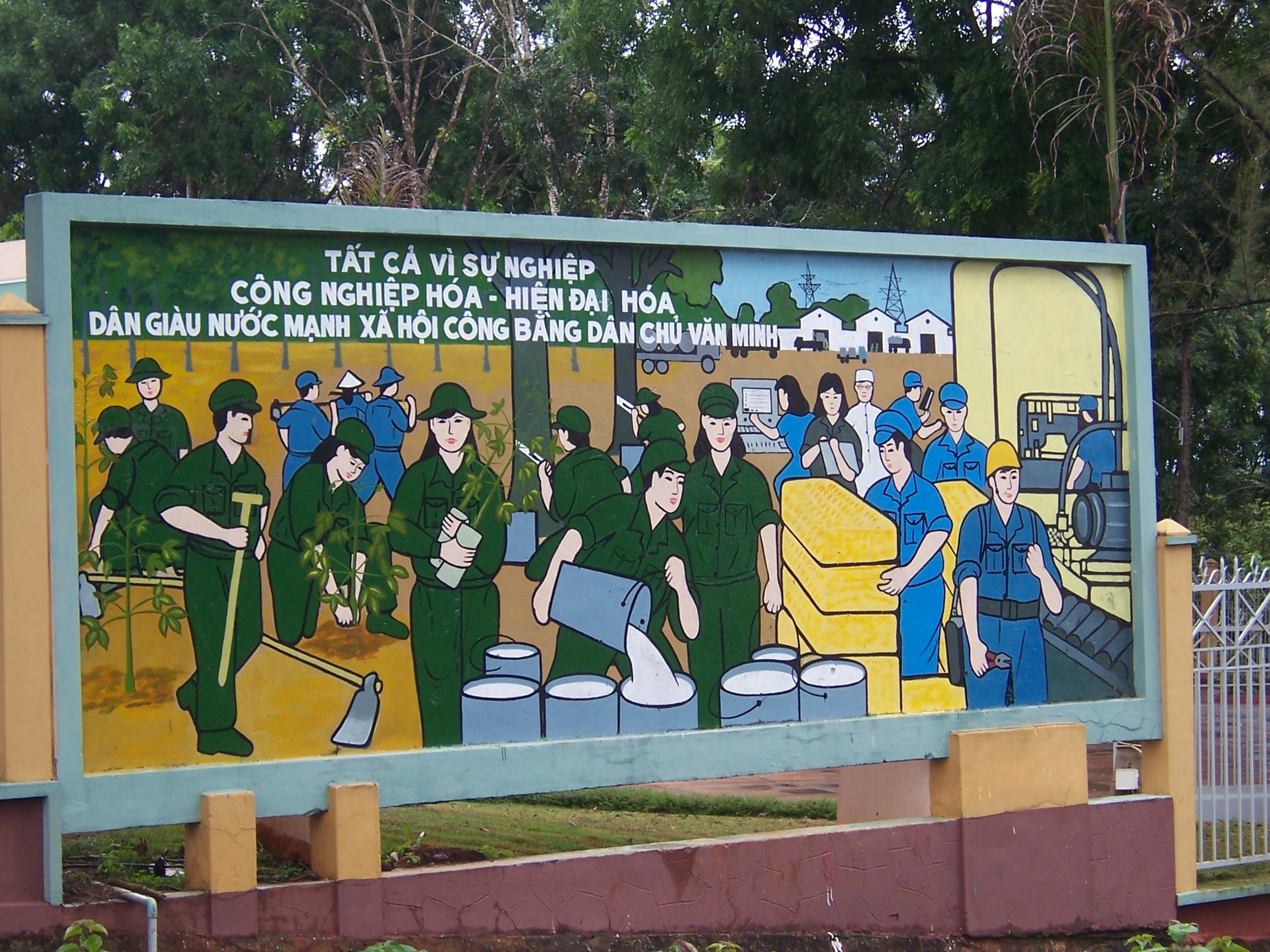 May 24, 2018: Mitch Aso, “Rubber and the Making of Vietnam”
May 24, 2018: Mitch Aso, “Rubber and the Making of Vietnam”
Mitch Aso is an Assistant Professor of the Global Environment, at the University at Albany (State University of New York). Rubber has been a key commodity for industrial societies since the nineteenth century. Yet, studies of the impact of the production of this good on various regions around the world have mostly been narrowly focused on the industry and its workers. Mitch Aso’s forthcoming book, Rubber and the Making of Vietnam, adopts a broader lens–what Aso calls an ecological history–to examine the role of rubber in shaping Vietnamese society in the twentieth century. Through this lens, Aso examines how the evolving relationships between humans and non-humans contributed to both the projects of empire and nation building. He argues that rubber, and rubber plantations, structured the material and symbolic bodies and landscapes of the postcolonial nation of Vietnam. The talk will touch on the promises and the perils of such ecological histories and the new perspectives on the past that they offer.
May 16, 2018: UCSC Night at the Museum — “Global 1968: Race and Revolution around the World”
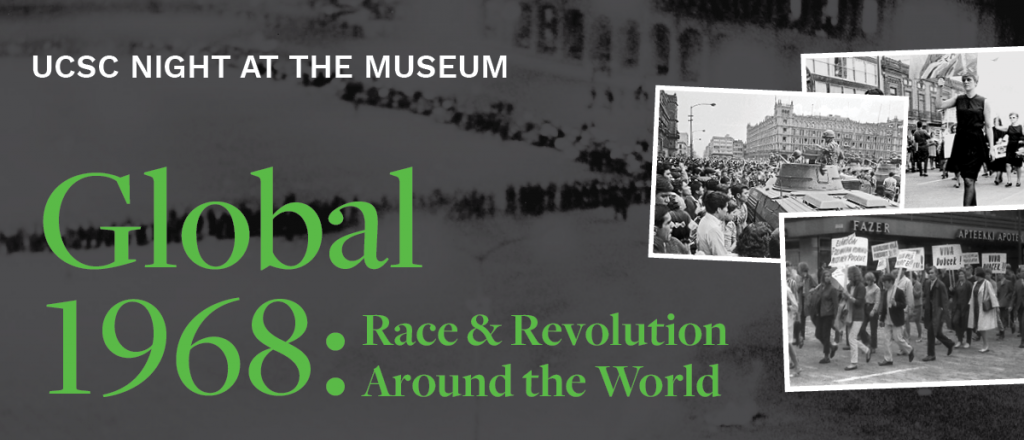
Fifty years ago, countries and cities around the globe erupted with protests and revolutionary movements demanding change and seeking to create a better future. Featuring four renowned historians, “Global 1968” spotlights marginalized groups and lesser-known events and places in the global upheavals of 1968—from Mexico to China, Oakland to West Africa—while considering what lessons can be drawn for politics and protest today.
Speakers:
Jean Allman (Washington University in St. Louis)
Jaime Pensado (University of Notre Dame)
Donna Murch (Rutgers University)
Emily Honig (UC Santa Cruz)
Moderated by: Marc Matera (UC Santa Cruz)
Co-sponsored by: The UCSC Humanities Institute and the History Department. Part of The Humanities Institute’s Freedom and Race Series, funded by the Andrew W. Mellon Foundation.
 April 7, 2018: GRAD CONFERENCE: Intimate States: Family, Domestic Space, and the State
April 7, 2018: GRAD CONFERENCE: Intimate States: Family, Domestic Space, and the State
Co-Sponsored by the Society for the History of Children and Youth, Cowell College, and the UCSC Humanities Institute
View the program here.
During the global modernization drive, states and political movements often tied modernization to changes in gender roles and family structures; however, states’ and political movements’ attention to family practices was not new to the modern era. Efforts at state intervention in the domestic sphere have included early modern China’s regulation of family structures, colonial states’ removal of indigenous children from their families, and Soviet housing construction and provision. The UCSC Center for World History is excited to host a graduate-student conference that will explore early-modern and modern examples of such state and political interactions with the family. The program was coordinated by graduate students at UCSC, and the presenters include graduate students from around the UC system. Professor Mary Jo Maynes, of the University of Minnesota, author of The Family: A World History and Schooling in Western Europe: A Social History, will give a keynote lecture.
 February 22, 2018: Titas Chakraborty, “Controlling ‘Quarrelsome Workers’: Boatmen of Bengal, English East India Company State and the Global Mobility Transition, 1701-1806”
February 22, 2018: Titas Chakraborty, “Controlling ‘Quarrelsome Workers’: Boatmen of Bengal, English East India Company State and the Global Mobility Transition, 1701-1806”
Titas Chakraborty completed her Ph.D. at the University of Pittsburgh in 2016 and is currently a postdoctoral fellow at the Institute for Historical Studies at the University of Texas. She is writing a book with the working title of “Mobile Workers of the Companies: Labor, Migration and Resistance in Bengal, 1650-1837.” It investigates Bengali workers for the East India Company and their lives, mobility, and resistance in the Indian Ocean World.
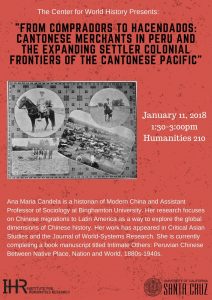 January 11, 2018: Ana Candela, “From Compradors to Hacendados: Cantonese Merchants in Peru and the Expanding Settler Colonial Frontiers of the Cantonese Pacific“
January 11, 2018: Ana Candela, “From Compradors to Hacendados: Cantonese Merchants in Peru and the Expanding Settler Colonial Frontiers of the Cantonese Pacific“
Ana Maria Candela is an assistant professor of sociology at Binghamton University. Her research focuses on Chinese migrations to Latin America and on the global dimensions of Chinese history and China’s social transformations. She is currently working on a book manuscript that examines Peruvian Chinese transnationalism through a translocal history of Chinese migrants to Peru within the context of the unfolding global processes of migration, colonization and national development from the 1870s to the 1940s. [Dr. Candela earned her Ph.D. from the UCSC History Department in 2013.]
 October 6, 2017: “Writing Across Cultures in the Early Modern World”
October 6, 2017: “Writing Across Cultures in the Early Modern World”
In the past decade, historians and literary scholars have become increasingly interested in the global circulation of the written word. Much of this scholarship has focused on the movement of printed books. Other projects, such as Stanford’s Mapping the Republic of Letters initiative, have traced epistolary networks that spanned continents and oceans. But what about the cross-cultural movement of textual artifacts that weren’t books or letters? This symposium will explore the limits of book history. At what point does an object shade into being a textual artifact? How can we make space for a less Eurocentric book history by following the itineraries of objects, like textiles, tattoos, or mummies, which encoded information in ways that differed from the format of book or the letter?
Co-sponsored by the “Andrew W. Mellon Fellowship of Scholars in Critical Bibliography at Rare Books School”
2016-2017 Speaker Series
May 8: Brett Rushforth “‘Daily Trafficke with the Frenchmen’: Merchant Colonialism and African Sovereignty in the Sixteenth-Century Atlantic”
March 9: Zachary Lockman, “Adventures in Field-Building: On the History of Area Studies/Middle East Studies in the United States”
February 23: Ruth Mostern, “Loess is More: A Spatial and Ecological History of Erosion on Imperial China’s Northwest Frontier”
November 17: Marc Matera, “The Global 1930s: The International Decade”
Past NEH Initiatives
2009 National Endowment for the Humanities Summer Seminar
